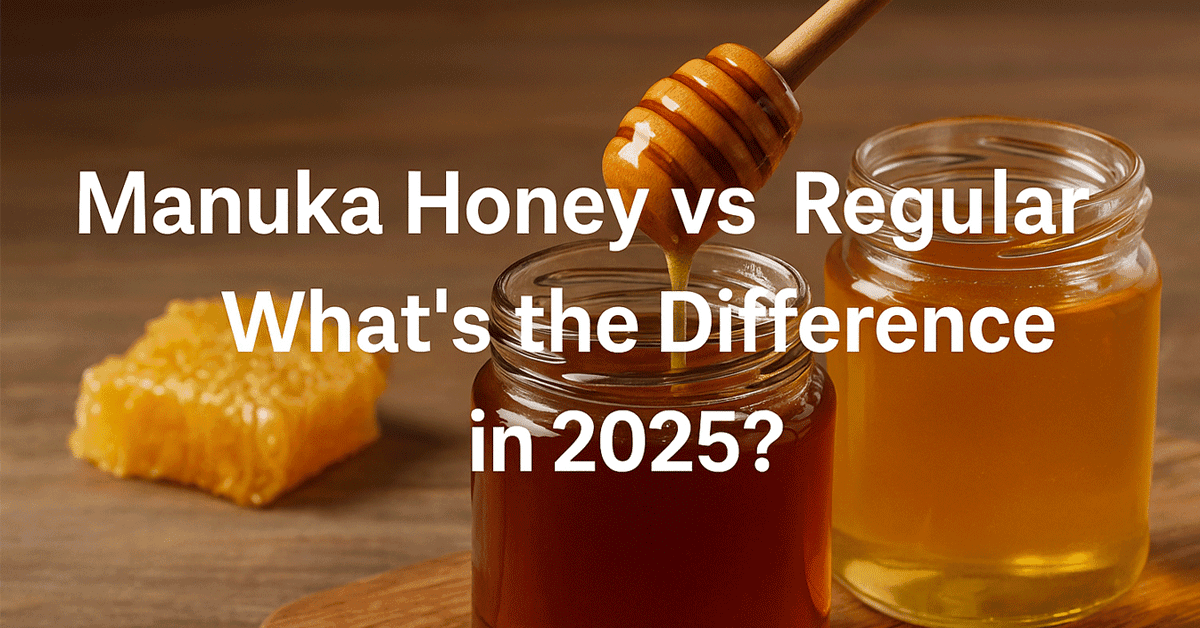August 19, 2025
Health Basics

Table of Contents
Reader note: This is a food and lifestyle guide. It makes no health or medical claims.
What Is Manuka Honey?
Manuka honey is a single-origin honey made from the nectar of the Manuka/tea-tree plant (Leptospermum scoparium), primarily in New Zealand and parts of Australia. Because the flower source and supply are limited, Manuka often appears with special labeling and a higher price point.
Single-origin focus: flavor can be earthy or herbal, with a dense mouthfeel.
Not a medicine: labels describe composition and origin, not medical effects.
What Do UMF™ and MGO Mean?
You’ll see Manuka sold with UMF™ numbers (e.g., 5+, 10+, 15+) or with MGO values on the label.
UMF™ is an industry grading system that reflects a set of Manuka markers (e.g., methylglyoxal, leptosperin) and authenticity controls.
MGO indicates the measured methylglyoxal content (mg/kg).
These are labeling/quality indicators, not promises of health outcomes. Always read the full label and buy from reputable brands.
What Counts as Regular Honey?
“Regular” honey is a broad term for multifloral or single-floral honeys commonly found in stores. They may be pasteurized and filtered for clarity, or sold as raw/unfiltered with natural pollen and wax particles.
Manuka vs Regular: Practical Differences
Floral source & taste
Manuka: usually deeper, slightly herbal, thicker.
Regular: varies by flower source—often lighter and more floral.
Labeling
Manuka: may show UMF™ or MGO; origin is typically listed.
Regular: usually lists honey type (acacia, wildflower, clover) and country of origin.
Price & gifting
Manuka: limited supply + certification → typically higher price; popular for gift-quality packaging.
Regular: everyday pantry staple with wider formats and price points.
Use cases (non-medical)
Manuka: toast, cheese boards, yogurt bowls, small tasting portions.
Regular: daily sweetener for warm—not boiling—tea, oats, baking, and marinades.
Raw vs Pasteurized Honey (Not a “better/worse,” just different)
Raw/unfiltered: minimally processed; may show natural crystallization and tiny pollen/wax particles.
Pasteurized/filtered: heated and finely filtered for clarity and consistency; tends to resist crystallization longer.
Crystallization is normal. To reliquefy gently, place the jar in ~40 °C warm water.
Storage & Safety Basics
Keep sealed in a cool, dry place away from moisture.
Use clean, dry utensils to avoid contamination.
Allergen note: bee products can trigger sensitivities in some people.
Important: Infants under 12 months must not consume honey.
Buying Tips & Authenticity Checks
Read the ingredient list (simple and clear).
Look for origin, lot/batch number, and producer contact.
For Manuka, prefer brands that disclose UMF™ licensing or MGO testing.
Be cautious with prices far below market or vague “miracle” wording.
Packaging should be intact—no leaks, swelling, or unusual odors.
Who Typically Chooses Manuka?
Fans of single-origin honeys, gift shoppers, or people who prefer a denser, more distinctive flavor profile. For everyday sweetening in larger volumes, many households keep a regular multifloral honey on hand.
Friendly Reminder
This article is non-medical and does not provide health or treatment claims. Choose honey based on taste, format, labeling transparency, and budget.
Simple FAQs
Q1. Is Manuka the same as raw honey?
No. Manuka describes the flower source; raw describes how it’s processed. You can find raw or pasteurized versions of many honey types.
Q2. Why did my honey crystallize?
Crystallization is natural. Warm the jar in ~40 °C water and it will loosen.
Q3. Can I add honey to hot drinks?
Yes—use warm, not boiling water to keep flavor pleasant.
Q4. How do I check if Manuka is authentic?
Look for UMF™ license details or MGO testing, origin, batch/lot number, and reputable sellers.
Q5. Who should avoid honey?
People with bee-product allergies should check labels and consult a professional if unsure. Infants under 12 months must not consume honey.
Power Up Your Day - Safely and Effectively.
Have questions or need support? Reach out to us directly:
Tell us What You Need
Fuel Your Day. Live Your Strength.
The Highest Quality
Comprehensive product safety assurance
At Maxed Male, we take pride in our strong capabilities in research and development, state-of-the-art production, and premium product quality. Our experienced R&D team works closely with nutritionists and health experts to create scientifically backed formulas designed to improve men’s vitality, performance, and overall well-being.
We operate GMP-certified facilities equipped with advanced machinery to ensure strict quality control throughout every stage—from raw material selection to final packaging. Whether it's our royal honey sachets, capsules, or herbal supplements, every product is manufactured to meet international standards for safety, purity, and effectiveness on health solutions. We are committed to continuous innovation and customer satisfaction, providing customized formulations and private labeling solutions for global partners.

